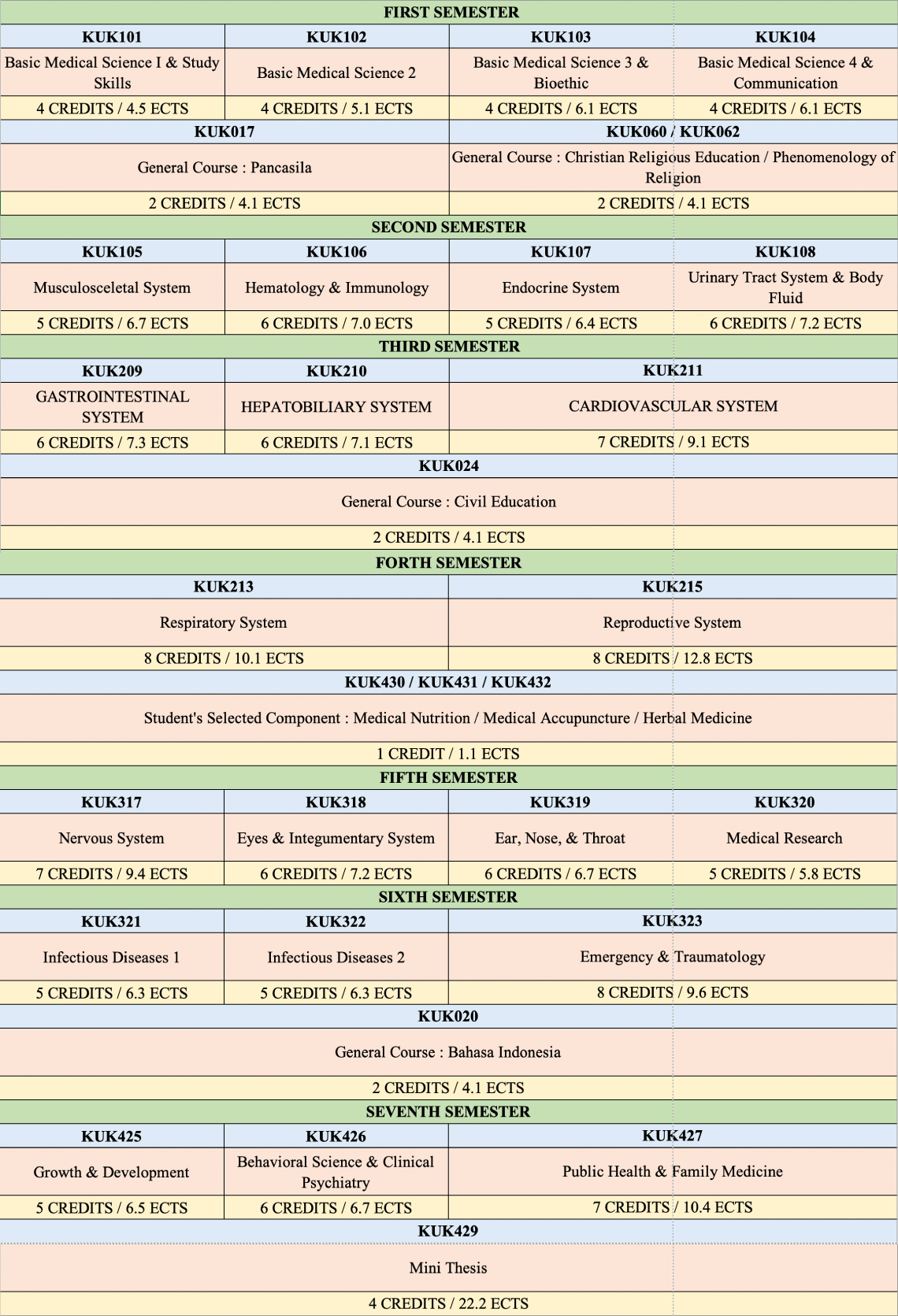The Medical Doctor Education Program consists of the Academic Stage (Bachelor of Medical Doctor Education) and the Professional Stage (Medical Doctor Professional Education/P2D).
The Academic Stage (Bachelor of Medical Doctor Education) accepts prospective students from high school who major in science through an entrance selection test. The link https://www.maranatha.edu/info-pmb/contains information about admission selection/New Student Admissions. At the academic level, students gain learning experience with a study load of 146 credits (210 ECTS) that can be completed in 7 semesters (3.5 years). Academic learning is divided into 28 learning units called “Blocks” that are based on organ systems. Within each block, there is horizontal and vertical integration of various Medical Sciences (Basic Medicine, Clinical Medicine, Public Health Sciences). Face-to-face lectures, PBL (Problem Based Learning) tutorial discussions in small groups, practicum in the medical skills laboratory, clinical skills training (in the skills lab), case presentations, and mini symposiums are used to teach in each block. The exam is administered using various instruments in accordance with the learning method. There are computer-based MCQ (CBT/ computer based test) components of the Knowledge Material written exam (MP exam), OSPE (objective structured practical examination), practicum exam components, OSCE (objective structured clinical examination), and SOCA (Student Oral Case) oral exams. (Student Oral Case Analysis).
The Maranatha Christian University Medical School Program’s Medical Doctor Education Curriculum is a Competency-Based Curriculum (KBK) based on the KKNI (Indonesian National Qualifications Framework) and in accordance with the Competency-Based National Curriculum (NCBC) and the most recent Indonesian Doctor Competency Standards (SKDI). In addition to the KKNI and SKDI competencies, the KBK in the Medical Doctor Education Program of the FK Maranatha Christian University contains local competencies of medical herbs and medical nutrition that can be chosen in elective courses. Medical Doctor Education Program Maranatha Christian University also offers elective acupuncture courses. To complete their final project, Maranatha Christian University Medical Doctor Education Program students are required to conduct research and write reports in Scientific Writing (KTI). The KTI defense takes the research findings into account.
Students can take the judiciary for graduation after graduating from all blocks and KTI, as well as passing the comprehensive exam at the end of the seventh semester. A Bachelor of Medicine (S.Ked.) degree is awarded to medical undergraduates who complete the academic/educational stage.
The Profession Stage (Medical Doctor Professional Education/P2D) only accepts Bachelor of Medicine (S.Ked.) graduates with a certain minimum GPA. Professional education (P2D) is provided at the Teaching Hospital in collaboration with FK Maranatha Christian University, specifically:
Immanuel Hospital Bandungis the main teaching hospital (Type B Hospital, fully accredited according to SNARS and accredited as a Teaching Hospital).
Network Education Hospitals (Affiliates and Satellites):
- Bhayangkara Sartika Asih Hospital
- Cisarua Mental Hospital
- Dr. Salamun Air Force Central Hospital
- Dr. Hasan Sadikin Hospital (specially for practice in Forensics)
- Rotinsulu Pulmonary Hospital
- Unggul Karsa Medika Hospital (UKM) owned by the Maranatha Higher Education Foundation
- PINDAD General Hospital Bandung
Education in P2D is carried out using Bedside Teaching (BST), Case-based Discussion (CDB), mini-lecture, Clinical Science Study (CSS) methods. (CSS). All learning takes place in small groups of 5-10 students known as pre-service doctors, who are supervised by a clinical supervisor known as a preceptor. Guidance is provided in setting ethical clinical service settings to ensure patient safety in inpatient wards, outpatient clinics, emergency departments (IGD), delivery rooms, operating rooms, and intensive care units (ICU). The evaluation begins with a bi-weekly examination in the form of a mini-Cex clinical skills test (mini Clinical examination), followed by an assessment of action skills using DOPS (Directly observed Procedural Skills). Written exams assess knowledge and comprehension, while oral exams in the form of long case and SOCA assess clinical reasoning skills. Professional behaviour or attitude while in the hospital is also the most important element to be assessed in professional education.
Professional Education for Medical Doctors is delivered in a rotational system through 13 clinical sections in hospitals and Field Learning Experiences at Community Health Centers. The rotation is completed in two years, with a study load of 45 credits (120 ECTS). One of the elective clerkships (Medical Herbal and Medical Nutrition, Pulmonology, Externship in Overseas Hospitals) with a study load of one credit is required.
Students (pre-service doctors) who have completed all rotations must take the national final exam (exit exam) known as the UKMPPD (Physician Profession Program Student Competency Test), which includes both the CBT and OSCE written exams. After graduating from UKMPPD, students have the right to participate in a doctor’s judiciary, as well as the obligation to take a doctor’s appointment/oath (Hippocratic Oath) and hold the title of Doctor.Hippocratic Oath) dan berhak menyandang gelar Dokter.

![]() Download MODUL HANDBOOK MEDICAL DOCTOR BACHELOR EDUCATION PROGRAM
Download MODUL HANDBOOK MEDICAL DOCTOR BACHELOR EDUCATION PROGRAM
CLINICAL PHASE

![]() Download MODUL HANDBOOK MEDICAL DOCTOR PROFESSIONAL EDUCATION PROGRAM
Download MODUL HANDBOOK MEDICAL DOCTOR PROFESSIONAL EDUCATION PROGRAM


